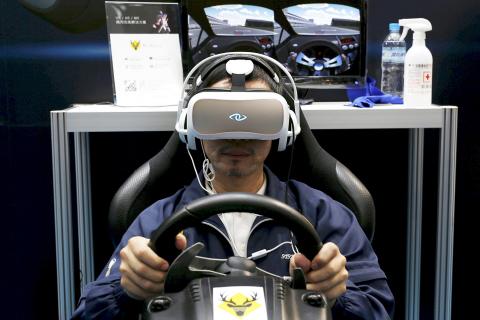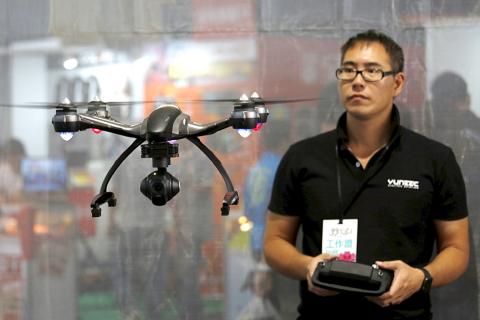The development of the virtual reality (VR) industry is still in its early stages, but the potential global market could reach US$13.5 billion by 2020 from this year’s US$2.54 billion, JPMorgan Securities Ltd said.
Apart from the anticipated fourfold increase in the overall market, gaming and entertainment applications are likely to take off faster than other VR applications, the brokerage said in a report.
“We think VR is promising and that it innovates the ways humans interact with machines,” JPMorgan analysts led by Narci Chang (張恆) said in the report issued on Thursday.

Photo: Tyrone Siu, Reuters
At the Taipei Spring Computer Show (Softex Taipei), which opened on Thursday and runs until Monday at the Taipei World Trade Center’s Exhibition Hall 1, VR products have drawn the most attention.
Swarms of VR fans lined up at a booth where they could experience a virtual roller-coaster ride by wearing a VR headset and sitting in a specially designed chair.
JPMorgan analysts forecast that the VR industry could register a compound annual growth rate of 43 percent in shipments, from an estimated 21.6 million units this year to 89.3 million units by 2020.

Photo: Tyrone Siu, Reuters
Gaming is one of the major applications and an important growth driver for the industry, as many hardcore gamers are willing to spend money on VR products, the report said.
Entertainment would be the second application to blossom in the VR industry, the report said. That is because VR could work well for sport and entertainment events, allowing viewers to feel the excitement and mood of the crowd, it said.
At Softex Taipei, for instance, local golf course operator Beckhan (貝克漢運動健康世界) displayed a VR simulator that can recreate 100 golf courses around the world, such as the one in Pebble Beach, California, so that golfers can practice.
While VR applications could also be used in several other areas, such as education, healthcare and the military, development might be limited to gaming and entertainment applications in the first few years, while other VR applications remain immature for the time being, the report said.
Among hardware devices, JPMorgan said smartphone-based VR would grow faster than PC and console-based VR products, due to cheaper prices and a cable-free user experience.
However, processors and the graphics processing units in smartphones are not as powerful as those in high-end PCs and gaming consoles, the report said.
In light of this, JPMorgan analysts forecast that smartphone-based VR would account for between 30 percent and 35 percent of VR revenues of US$2.54 billion this year, but the contribution would drop to between 15 percent and 20 percent by 2020.
Despite this seemingly promising trend in the longer term, efforts to “meaningfully monetize” VR businesses are still uncertain at the moment, the report said.
HTC Corp (宏達電), the Taiwanese smartphone company that is aiming to become a VR leader with its Vive headset, might generate 14 percent of its revenue from Vive this year, but it would still fail to offset its loss-making smartphone business, JPMorgan said.
The revenue contribution from the VR business at Everlight Electronics Co (億光), which supplies infrared LED and LED products for HTC’s VR headset, would be less than 1 percent of the firm’s total revenue, the report said.
Taiwan Semiconductor Manufacturing Co (台積電) would be the “ultimate” beneficiary in the VR industry, as strong demand for powerful chips and sensors would benefit GPU vendors and chipmakers, it said.

Sweeping policy changes under US Secretary of Health and Human Services Robert F. Kennedy Jr are having a chilling effect on vaccine makers as anti-vaccine rhetoric has turned into concrete changes in inoculation schedules and recommendations, investors and executives said. The administration of US President Donald Trump has in the past year upended vaccine recommendations, with the country last month ending its longstanding guidance that all children receive inoculations against flu, hepatitis A and other diseases. The unprecedented changes have led to diminished vaccine usage, hurt the investment case for some biotechs, and created a drag that would likely dent revenues and

Macronix International Co (旺宏), the world’s biggest NOR flash memory supplier, yesterday said it would spend NT$22 billion (US$699.1 million) on capacity expansion this year to increase its production of mid-to-low-density memory chips as the world’s major memorychip suppliers are phasing out the market. The company said its planned capital expenditures are about 11 times higher than the NT$1.8 billion it spent on new facilities and equipment last year. A majority of this year’s outlay would be allocated to step up capacity of multi-level cell (MLC) NAND flash memory chips, which are used in embedded multimedia cards (eMMC), a managed

CULPRITS: Factors that affected the slip included falling global crude oil prices, wait-and-see consumer attitudes due to US tariffs and a different Lunar New Year holiday schedule Taiwan’s retail sales ended a nine-year growth streak last year, slipping 0.2 percent from a year earlier as uncertainty over US tariff policies affected demand for durable goods, data released on Friday by the Ministry of Economic Affairs showed. Last year’s retail sales totaled NT$4.84 trillion (US$153.27 billion), down about NT$9.5 billion, or 0.2 percent, from 2024. Despite the decline, the figure was still the second-highest annual sales total on record. Ministry statistics department deputy head Chen Yu-fang (陳玉芳) said sales of cars, motorcycles and related products, which accounted for 17.4 percent of total retail rales last year, fell NT$68.1 billion, or

In the wake of strong global demand for AI applications, Taiwan’s export-oriented economy accelerated with the composite index of economic indicators flashing the first “red” light in December for one year, indicating the economy is in booming mode, the National Development Council (NDC) said yesterday. Moreover, the index of leading indicators, which gauges the potential state of the economy over the next six months, also moved higher in December amid growing optimism over the outlook, the NDC said. In December, the index of economic indicators rose one point from a month earlier to 38, at the lower end of the “red” light.